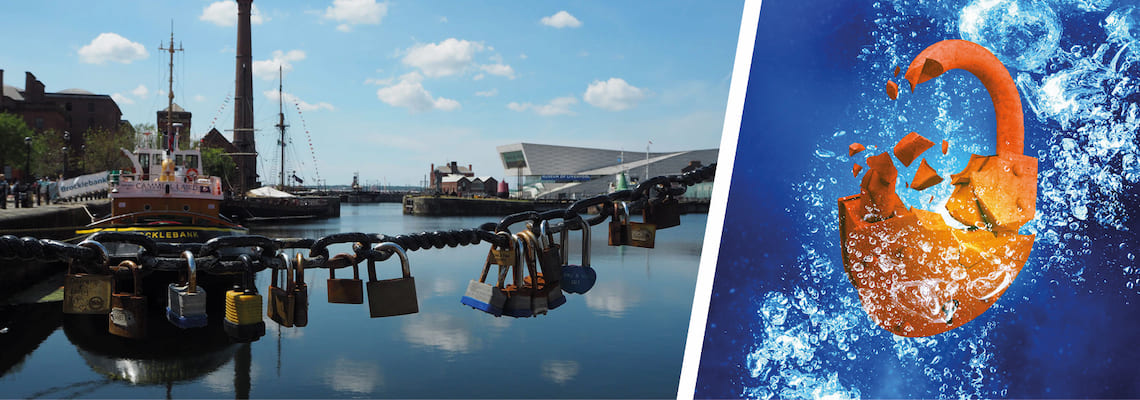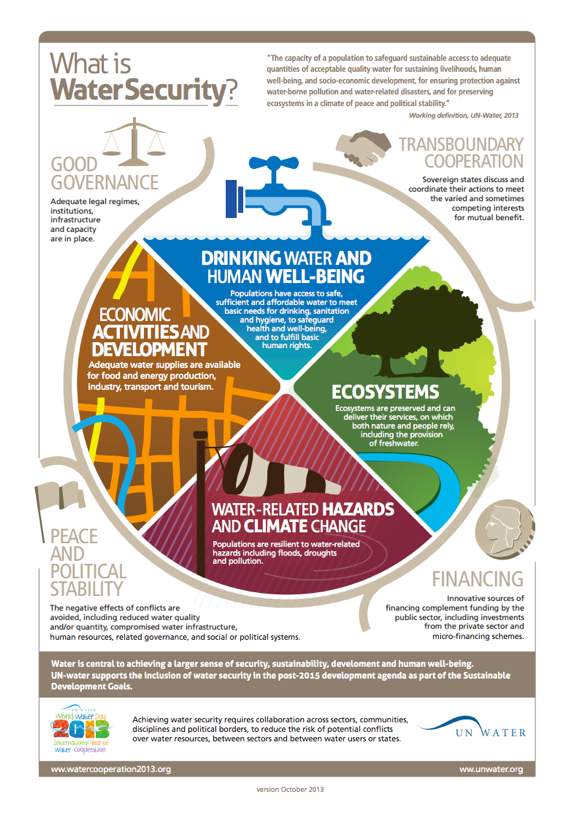
Water security is more important than ever before but also faces increased risks, resulting from climate change, geopolitical conflicts and human activity. Critical to communities, industry and agriculture, the security of water supply underpins society.
A recent report from the World Bank shows that water scarcity, exacerbated by climate change, could cost regions up to 6% of their GDP, spark conflict and spur migration.
Yet, how do you define water security?
According to the United Nations Water (UN-Water) water security can be defined as: “The capacity of a population to safeguard sustainable access to adequate quantities of acceptable quality water for sustaining livelihoods, human well-being, and socio-economic development, for ensuring protection against water-borne pollution and water-related disasters, and for preserving ecosystems in a climate of peace and political stability.
This was the definition proposed by the UN-Water back in 2013 to open international talks on global water security.
This was the definition proposed by the UN-Water back in 2013 to open international talks on global water security.

While that definition by the UN-Water is comprehensive, what does water security mean?
Water security is designed to safeguard all aspects of water, from our everyday water use to water in our ecosystems, to even political and transboundary conflicts that may arise over water.
“The idea of water security is that it is achievable through mass collaboration from every country, industry and sector in the hopes the one day we can have water security.”
When discussing water security, it can be easy to think of it as a set of rules or guidelines that countries should be adhering to keep their water safe and secure. In reality, this is not the case.
Water security entails ensuring an adequate supply of clean water to meet present and future human needs while safeguarding the environment, reducing pollution risks, and preventing waterborne diseases.
It also seeks to establish good governance of water and transboundary co-operation from countries that share a water source. Water security also looks to exempt itself from human conflicts to ensure that our global water infrastructure is never compromised and that there is enough finance to allow for development and innovation.
Water security encompasses the comprehensive management of water resources to ensure sustainable availability for future generations. Smart water technologies play a crucial role in achieving this goal.
In the past decade, two terms have found themselves at the centre of the environment and water sectors respectively, those being smart cities and smart water.
The UK Department for Business, Innovation and Skills (BIS) defines smart cities as a process in which increased citizen engagement, hard infrastructure, social capital and digital technologies make cities more liveable, resilient and better able to respond to challenges.
Navigant Research found that cities around the world planned to invest $108 billion in smart city infrastructure this decade.
It is much needed, as the UN found that 68 per cent of the world’s population is projected to live in urban areas by 2050 – so there will be an added pressure for cities and urban areas that can adapt to handle an increased pressure on its resources.
Much like a smart city, smart water and smart wastewater infrastructure is water that can be measured and record data on various elements, such as quality and usage.
According to the UN report looking into water security and the sustainable development goals for 2019, a city’s water distribution and management system must be sound and viable in the long term to maintain its growth.
The report went on to say that any smart water system should be equipped with the capacity to be monitored and networked with other critical systems to obtain more sophisticated and granular information on how they are performing and affecting each other.
Smart water security uses monitoring technology to gather meaningful and actionable data about the flow, pressure and distribution of a city’s water and wastewater. The data that is returned can then be used to create accurate measurements on water consumption and accurately forecast water use.
It is this data that is vital to achieving smart water security in our urban environments, as having this live feed of data allows for the smart cities to share every aspect of their water usage. Through smart water security and the data it collects, cities are able to better estimate water usage, assess the quality of the water and design improved urban water systems.
Water security is paramount in today's world, as highlighted by the 2018 UN report on water and sanitation, which revealed that over 2 billion people reside in nations facing severe water stress.
Amidst the escalating challenge of water scarcity worldwide, attaining water security emerges as a pivotal solution to combat this pressing global issue.
To find out more, explore our essential guide to water scarcity.
Key water sustainability facts from the UN-Water:
Water security is crucial for agricultural management, especially considering that the agriculture sector is one of the biggest consumers of freshwater, accounting for 70% of global usage, per the WEF.
Water security in agriculture brings manifold benefits. Adopting new technologies enables better monitoring and management of water usage in high-demand sectors.
These benefits include reducing freshwater usage in the industry, detecting water quality and removing pollutants, and enhancing water distribution to alleviate water stress during critical periods.
Water scarcity has the potential to cause several global water security issues, according to Global Communities. They determined five key areas where water security could impact global security:
Principles
In the book Water Security: Principles, Perspectives and Practices, edited by Bruce Lankford, Karen Bakker, Mark Zeitoun and Declan Conway, they look at what the principles of water security should be.
They identified that principles of water security are environmental sustainability, collaboration, the independencies of water such as its role in energy generation, demand from cities, climate change and food, and the equity and justice surrounding water.
These are the foundations of what water security should represent and where we need to look closer to get the correct perspective to implement the right practices.
Perspective
Perspective plays a massive role when discussing water security, as the same perspective may not apply to every principle.
For example, from a legal perspective water security is associated as a set of rules to secure entitlements for certain quantities of water. Whereas from an agriculture standpoint, the main issue of water security is seeking protection from floods and droughts.
When looking into any area of water security each sector will have its perspective that will need to be taken into account.
Practices
Only once you have defined the principle and perspective can you determine the right course of action and practices to introduce to achieve water security.
For example, what practices need to be introduced in a poor community that does not have reliable access to fresh water?
Water Aid looked at ways in which different practices could be implemented in a community like this and created a list of practices that would help achieve water security:
By 2030, as reported by The Guardian, the world will require approximately 40% more freshwater and 50% more food and energy. This surge can be linked to the escalating global population, which is expected to further strain our food and water security.
To combat this, we need to find solutions to keep our food and water security going forward. The WBCSD Water Project looked into the long term impact of food and water security, and three solutions can be drawn from their report.